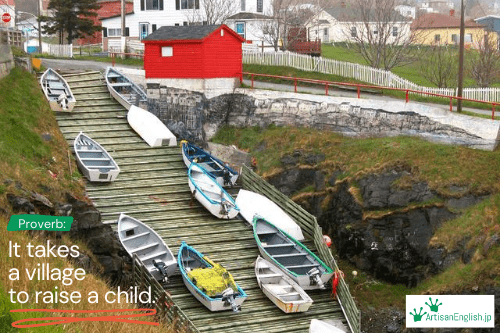
YouTube / iTunes / Spotify / Radio Public / Pocket Casts / Google Podcasts / Breaker / Overcast
Listen to ArtisanEnglish.jp posts & lesson intros here.
Proverb: It takes a village to raise a child
The English language has proven very adept at borrowing words and expressions from other languages and cultures.
The proverb, ‘It takes a village to raise a child,‘ is a good example.
This proverb can be found in several African cultures.
It is famous as the title of the 1996 book ‘It Takes a Village and Other Lessons Children Teach’ by Hillary Rodham Clinton.
So, what the heck does it mean?
Well, it means that it requires an entire community to keep a child safe and enable them to grow up in a healthy environment.
That’s why I included a picture of my hometown.
Growing up in a small fishing community in Newfoundland, Canada, everyone knew everyone.
There were no secrets.
If I were doing something stupid such as riding my bike without holding on to the handlebars or cutting through someone’s potato patch, they would scold me and then tell my father.
It takes a village to raise a child, and that’s what they did.
One time, I was struck by a car and broke my leg.
A fisherman in the community who witnessed the accident picked me up and brought me home.
He knew where I lived because everyone knew everyone.
I didn’t have to lie on the street waiting for an ambulance to travel 20 km to get there or for someone to call my parents.
If I were being bullied or doing the bullying, no adult hesitated to put a stop to it.
We, kids, were raised by the community and always felt safe no matter where we went.
Our parents also felt safe, allowing us to roam miles and miles from home.
It may be an African proverb, but we are all human, and no matter where we live, it takes a village to raise a child.
Flesch-Kincaid Readability Test
This post is understandable by someone with at least a 7th-grade education (age 12).
On the Flesch-Kincaid reading-ease test, this post scores 74.
The easier a passage is to read, the higher the score on a scale of 0 – 100.

